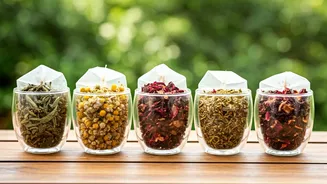Tea for Cholesterol
Herbal teas have long been valued for their health benefits, and recent research highlights their effectiveness in managing cholesterol levels. High cholesterol is
a significant risk factor for heart disease, making it crucial to find natural ways to combat it. This article focuses on five herbal teas, each with unique properties that can contribute to lower cholesterol. Integrating these teas into your diet can be a delicious and proactive step towards heart health. Furthermore, these teas offer various additional advantages that collectively improve overall wellness. It's a holistic approach, combining taste, enjoyment, and substantial health benefits.
Hibiscus' Heart-Healthy Effects
Hibiscus tea, known for its vibrant color and tart flavor, has been studied extensively for its ability to lower both cholesterol and blood pressure. Studies have demonstrated that regularly consuming hibiscus tea can reduce LDL (bad) cholesterol levels, which are linked to arterial plaque buildup. Its antioxidant properties, derived from polyphenols, further protect the cardiovascular system. Hibiscus tea also improves blood vessel function, assisting in the prevention of heart complications. To maximize the advantages, consider drinking hibiscus tea daily, prepared with either hot or cold water, depending on personal preference. This versatile tea can be enjoyed plain or flavored with a touch of honey or lemon to enhance its taste.
Green Tea's Power
Green tea, a cornerstone of traditional wellness, is packed with catechins, powerful antioxidants associated with various health benefits, including lower cholesterol levels. Catechins help to block the absorption of cholesterol in the gut, preventing its accumulation in the bloodstream. Regular consumption of green tea can also enhance the body's metabolism and promote efficient fat burning. This can indirectly improve cholesterol profiles by reducing overall body fat. The unique combination of antioxidants and other beneficial compounds in green tea, coupled with its natural flavor, makes it an excellent choice. To gain the most from green tea, brew it fresh and drink it multiple times a day. Additionally, incorporating green tea into your lifestyle can provide a refreshing and invigorating start to the day.
Oolong's Cholesterol Boost
Oolong tea, a partially oxidized tea, bridges the gap between green and black tea and boasts remarkable properties, notably its impact on cholesterol. Research indicates that oolong tea can decrease the levels of LDL cholesterol and improve overall lipid profiles. This is achieved through the tea's unique composition of antioxidants and bioactive compounds. The antioxidants in oolong tea assist in preventing the oxidation of LDL cholesterol, which is a major factor in the formation of plaque. Consuming oolong tea frequently can contribute to enhanced heart health and reduce the risks associated with high cholesterol. Incorporating Oolong tea into your daily routine is simple; you can experiment with different brewing methods to find the optimal taste and benefits.
Garlic's Heart Support
Garlic tea, although less common, offers substantial heart-health advantages, particularly in terms of cholesterol management. Garlic includes allicin, a potent compound proven to reduce LDL cholesterol and improve overall cardiovascular function. Allicin helps to prevent the buildup of plaque in arteries and improves blood flow, thereby lowering the risk of heart disease. In order to get the benefits, a small amount of freshly crushed garlic can be steeped in hot water, producing a tea that offers a blend of flavor and health benefits. Although the flavor can be intense, the rewards for your heart's well-being are significant. The regular intake of garlic tea, combined with other heart-healthy practices, can considerably enhance your cardiovascular health.
Conclusion: A Tea Strategy
In conclusion, integrating herbal teas into your diet is a flavorful and effective approach to managing cholesterol levels and promoting heart health. Each of the five teas discussed – hibiscus, green tea, oolong tea, and garlic tea – provides unique benefits that can significantly contribute to cardiovascular well-being. By making these teas a regular part of your routine, you can experience a holistic improvement in your health and quality of life. Remember to consult with a healthcare professional to determine which teas are best suited for your individual needs and how they can complement other treatments or lifestyle modifications. This approach will offer a practical and pleasurable way to support a healthy heart.













